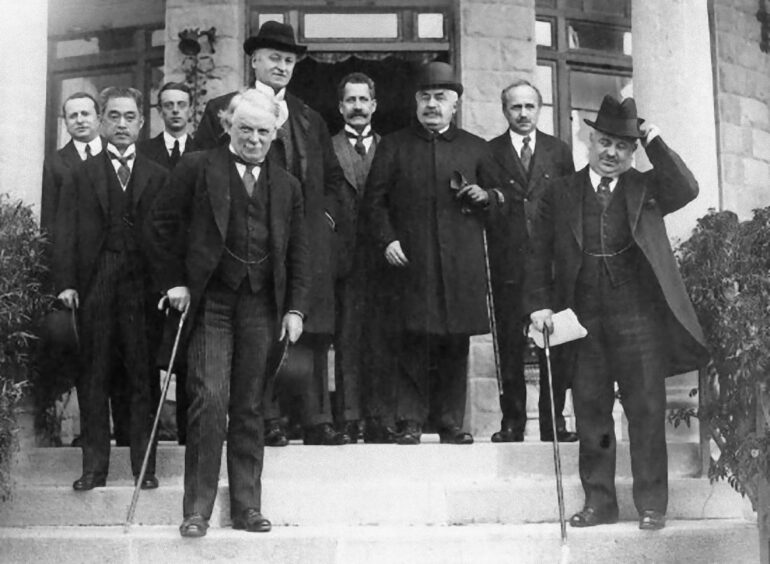On April 26, 1920, the League of Nations met in San Remo, Italy to divide up the Semitic region that had previously been ruled by the Turkish Ottoman Empire.
Many Zionists consider this to be an important historical event for the people of Israel because the leaders of World War I’s victorious Allied Powers acknowledged Jewish claims to an independent state in Palestine – a territory then spanning both sides of the Jordan River.
The decision by the colonial powers at San Remo essentially ratified Great Britain’s 1917 Balfour Declaration and its commitment to establish a Jewish national home in Palestine.
The LoN resolution has been argued by many Revisionist Zionists over the last century to be a binding document of international law. The World Zionist Organization – currently controlled by the Revisionist Likud party – even went so far as to produce a short (under 2 minutes) educational cartoon to mark the centennial.
The Zionist line of thinking tends to be that global opposition to Jewish sovereignty in the disputed Samaria and Judea regions partially stems from widespread ignorance of the fact that the San Remo Conference gave international legal legitimacy to Israeli rule in the entire country.
According to this rationale, reminding the world of Israel’s legal claim could go a long way in shifting the policies foreign governments pursue and the editorial context within which foreign journalists report.
But this naive rationale misses some crucial points.
For starters, the mandates established by the LoN at San Remo were essentially little more than a veneer for continued colonization. Inter-imperialist rivalries and the colonial appetites of European powers had received much of the blame for sparking a world war that unleashed unprecedented destruction across the globe.
British and French colonialism in the Semitic region had to be branded as something new that involved the willing consent of the natives and some vague promise of eventually allowing those natives to govern themselves.
In the case of Palestine, it should have been clear fairly early in the mandate period that the British not only made conflicting promises to other local populations but also that the empire had absolutely no intention of ever leaving. Oil piped underground to the port city of Haifa from Iraq (another British mandate) in the east and dominance over the Suez Canal to the west mixed with the historic prestige of ruling Jerusalem to make continued control over Palestine an important pillar of England’s foreign policy.
When London’s betrayal became obvious enough that some Zionists began to protest, those protests were directed at pressuring Britain to fulfill its commitments to the Jewish people. Even the most nationalist Zionists of the Revisionist persuasion refused to see a fundamental conflict of interests between British and Jewish national interests. Had the Leḥi (Fighters for the Freedom of Israel) – which recognized that conflict of interests very clearly – not launched an urban guerrilla war to make the price of occupation more expensive to England than the value of continued exploitation, the British would have likely never left Palestine.
When discussing the San Remo Conference in relation to the Land of Israel, we must also question whether international law is anything other than a mechanism for powerful nations to push their agendas on weaker countries.
Regardless of whether or not a global legal standard is desirable in world not yet fully homogenized by global capitalism (and if accepting said legal standard would serve to accelerate that global homogenization), there’s obviously a very clear bias in how international laws are applied. No one expects the United States or Germany to be held to the same legal standards as Libya, Iraq or even Israel. As much as some might hope to see George W. Bush, Tony Blair, Barack Obama and Hillary Clinton standing trial at the Hague’s International Criminal Court for their crimes, it’s not a realistic expectation under the current system.
The current popularly accepted interpretation of international law, which demands an Israeli withdrawal from the territories won in 1967, is popularly accepted primarily because it conforms to the self-perceived interests of the world’s most powerful nations. Successfully arguing the continued relevance and legal authority of San Remo at the United Nations isn’t likely to change how the international community understands the question of Israeli sovereignty in the West Bank.
But perhaps most important from the perspective of Jewish liberation is the question of why any of us should give the LoN, the UN or any other international body the authority to even decide what Israel’s borders should be.
Seeking recognition and acceptance from the international community has been an undeniable central pillar of Zionist thought since the movement’s late 19th Century inception. But contrary to Zionist mythology overemphasizing the role of diplomatic achievements in establishing and maintaining the Jewish state, Jerusalem’s desperation for approval from powerful nations whose interests don’t include the modern rebirth of Hebrew civilization has actually prevented Israel from acting in accordance with Jewish national interests countless times.
The very fact that Jewish nationalists lobby foreign governments to recognize and support Israeli sovereignty in the cradle of Jewish civilization already exposes a slave mentality and deep psychological subjugation to the forces of empire.
The same Zionists that attempt to use the 1920 San Remo Conference as an argument for Jewish sovereignty in Judea and Samaria tend to also accept the legitimacy of foreign leaders “granting” Israel permission to build in or annex our homeland today.






Sad you didn’t mentionned the partition proposed in 1920, 1922 that includes Judea and Samaria…
In the power struggle, we can also use the weaknesses and inconsistencies of these International bodies as flow they might me.